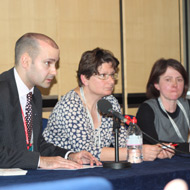Shedding light on pet imports and rabies

Jo Moran, RSPCA, Sharon Edwards, City of London Animal Health and Welfare Services, and Debra Wells, Defra.
Pet imports were in the spotlight today as a series of three talks were held at BSAVA Congress. With speakers from Trading Standards, the RSPCA and Defra, the talks covered all angles, focusing particularly on rabies and the Pet Travel Scheme (PETS).
Beginning the sessions was Sharon Edwards, a senior inspector for the City of London Animal Health and Welfare Services. Since January 2012, when the pet travel laws were relaxed, she says her team have seen a 400 per cent rise in reports about illegal imports within Greater London.
According to Sharon, in the majority of cases fraudulent puppy imports are reported by vets after discovering the animal cannot be the age claimed on its passport.
Often, these pets are advertised and purchased online and Sharon says pet owners' desire for "instant gratification", rather than taking the time to search for a responsible breeder, is fuelling the trade.
Some delegates at the talk say that having reported issues with pet passports to Trading Standards, they had struggled to get any response or action.
Following on from this, the RSPCA's senior parliamentary advisor Jo Moran, discussed a "sizeable loophole in the current pet passport system" and the charity's concerns over the risk of rabies to the UK.
Mr Moran also commented on an upcoming survey of vets, national government officials and other stakeholders. This will assess dogs and cats involved in commercial practices across numerous countries, including the UK, led by IBF International Consulting.
Debra Wells then took the stage to offer Defra's perspective on imports, noting a risk assessment conducted by the department that states individuals are 70,000 times more likely to be struck by lightening than to contract rabies in the UK.
Legislation changes are due to come into effect on December 29, 2014, some of which were outlined during Debra's talk. For example, a minimum age of 12 weeks will be introduced for puppies to be vaccinated against rabies.
In addition, minimum qualifications will be required for those implanting microchips, while amendments will be made to the current pet passport. This will include a new laminated strip which aims to make it more difficult to forge passports and extra pages and explanatory notes on how to fill out the passport correctly.
Vets issuing passports will also be required to fill in their details on a new page of the passport. It is hoped this will improve traceability.
Pet imports and rabies risk have been of rising concern among members of the veterinary profession since the laws were relaxed in 2012. A number of rabies cases around the world last year fuelled these concerns. Indeed, the BSAVA called for frontline veterinary staff to be vaccinated against rabies.



 The Veterinary Medicines Directorate (VMD) is inviting applications from veterinary students to attend a one-week extramural studies (EMS) placement in July 2026.
The Veterinary Medicines Directorate (VMD) is inviting applications from veterinary students to attend a one-week extramural studies (EMS) placement in July 2026.